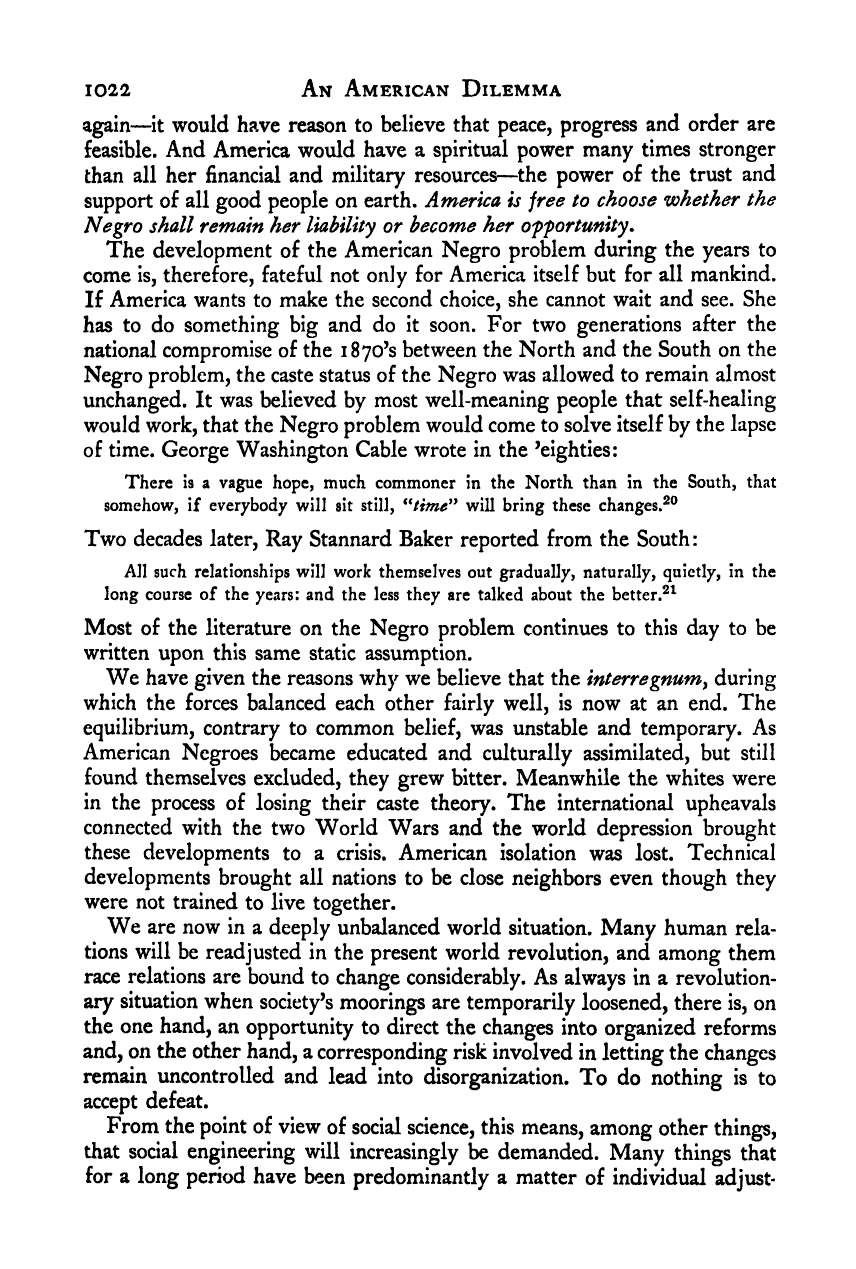Note: Gunnar Myrdal died in 1987, less than 70 years ago. Therefore, this work is protected by copyright, restricting your legal rights to reproduce it. However, you are welcome to view it on screen, as you do now. Read more about copyright.
Full resolution (TIFF) - On this page / på denna sida - XI. An American Dilemma - 45. America Again at the Crossroads in the Negro Problem - 10. America’s Opportunity

<< prev. page << föreg. sida << >> nästa sida >> next page >>
Below is the raw OCR text
from the above scanned image.
Do you see an error? Proofread the page now!
Här nedan syns maskintolkade texten från faksimilbilden ovan.
Ser du något fel? Korrekturläs sidan nu!
This page has never been proofread. / Denna sida har aldrig korrekturlästs.
1022 An American Dilemma
again—it would have reason to believe that peace, progress and order are
feasible. And America would have a spiritual power many times stronger
than all her financial and military resources—the power of the trust and
support of all good people on earth. America is free to choose whether the
Negro shall remain her liability or become her o’p’portunity.
The development of the American Negro problem during the years to
come is, therefore, fateful not only for America itself but for all mankind.
If America wants to make the second choice, she cannot wait and see. She
has to do something big and do it soon. For two generations after the
national compromise of the 1870’s between the North and the South on the
Negro problem, the caste status of the Negro was allowed to remain almost
unchanged. It was believed by most well-meaning people that self-healing
would work, that the Negro problem would come to solve itself by the lapse
of time. George Washington Cable wrote in the ’eighties:
There is a vague hope, much commoner in the North than in the South, that
somehow, if everybody will sit still, will bring these changes.^®
Two decades later, Ray Stannard Baker reported from the South:
All such relationships will work themselves out gradually, naturally, quietly, in the
long course of the years: and the less they are talked about the better.
Most of the literature on the Negro problem continues to this day to be
written upon this same static assumption.
We have given the reasons why we believe that the interregnum^ during
which the forces balanced each other fairly well, is now at an end. The
equilibrium, contrary to common belief, was unstable and temporary. As
American Negroes became educated and culturally assimilated, but still
found themselves excluded, they grew bitter. Meanwhile the whites were
in the process of losing their caste theory. The international upheavals
connected with the two World Wars and the world depression brought
these developments to a crisis. American isolation was lost. Technical
developments brought all nations to be close neighbors even though they
were not trained to live together.
We are now in a deeply unbalanced world situation. Many human rela-
tions will be readjusted in the present world revolution, and among them
race relations are bound to change considerably. As always in a revolution-
ary situation when society’s moorings are temporarily loosened, there is, on
the one hand, an opportunity to direct the changes into organized reforms
and, on the other hand, a corresponding risk involved in letting the changes
remain uncontrolled and lead into disorganization. To do nothing is to
accept defeat.
From the point of view of social science, this means, among other things,
that social engineering will increasingly be demanded. Many things that
for a long period have been predominantly a matter of individual adjust-
<< prev. page << föreg. sida << >> nästa sida >> next page >>